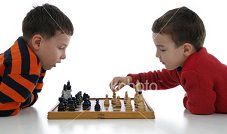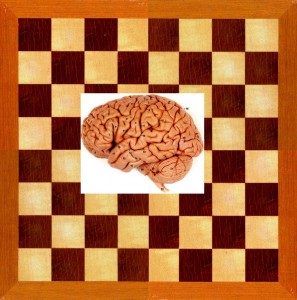
The numbers are only to draw attention, they do not tell the real story. If you are genuinely curious about it, don’t keep counting but keep reading on …
Several months earlier, we made an attempt to show how chess is beneficial to your mind. But that was aimed at beginners and amateurs so that they may seriously pursue their interest in chess not only for just fun and enjoyment but also for its other beneficial effects. Here we are trying to take it one step ahead to address parents with young children on how playing chess can be good for the whole family.
We firmly believe that any caring and sensible parent will like to see their children growing up to be intelligent, rational human beings who will make a success of their lives and be pillars of the society. The level and quality of interaction between the child and parents have a profound impact on the life and outlook when the child reaches adulthood. Developing an interest in chess and sharing it with children can be one of the ways, an enjoyable one too, which can help in this pursuit. We are trying to put our thoughts on areas where chess can make a positive contribution.
However, only at a few places we have referred to the child, leaving other benefits to be understood by parents and then to be explained by examples to their children. For example, without looking at the board at the start of a game, you can tell the child that if he moves his KP, his KB can go to the white square on the fourth row in front of his QB, from where it can target your black KBP on its white square. The child looks at the board, tries to play it out and accepts that what you said is true. You explain how visualization and planning works and encourage him to do that – you can make it a new kind of game between you and your child. You have to use your ideas on how to expose him to the other areas of the game so that he can reap the benefits.
1. Inquisitiveness – fueling the urge to learn
If you have observed the growing years of a child, what is sure to strike you is the unbounded inquisitiveness of a child. This lies behind the learning of any new subject or ideas. It is like a fire inside which needs constant supply of fresh fuel to sustain it. When he throws a toy, he is not being ‘naughty’ but trying to find out what happens if he throws it (a rubber ball bounces a lot, the toy car does not) or the kind of sound it makes. He puts things in his mouth to find out the difference in tastes. When he breaks a toy, he is trying to find out what lies inside or what makes it ‘tick’! But he may also be doing it simply to draw attention and seek company. You may have also noticed that a child soon loses interest in something that only a few weeks earlier was the dearest item. Why? Because he has learnt everything that was to know about it within his realm of experience and now looks for something fresh!
Only problem is that such inquisitiveness may get on to the nerves of the harassed young parents, increasing their household chores to clear up the ‘mess’. By teaching and playing chess with them, you can give them something that will sustain the interest for long, become more intriguing as they learn more, provide a challenge and at the same time ensure companionship (you cannot play chess with yourself!). You thus channel their energy in lines that help both the child and you as parent to develop …

2. Understanding and learning – one branch leads to another
Any exercise of the mind helps in its growth and what better exercise than trying to learn the intricacies of chess! Basically, chess is not at all a complicated game as far as rules are concerned. All you need to know is:
- the initial arrangement of pieces and pawns
- White’s first move
- check and checkmate
- capture as a part of movement
- 15 types of moves
- 6 for six types of chessmen with their individual but single rule of movement
- 4 more for the King (K-side castling, Q-side castling, not moving to a square controlled by opponent’s piece, immunity from capture)
- 5 more for the Pawn (initial double step forward, no backtracking, diagonal capture, en passant, promotion)
Other rules are for tournaments and can be disregarded in your family game. Therefore, starting on chess is much less daunting than what the uninitiated may think! But its pursuit builds up the ability to learn and understand. These mental faculties can be used in any other walks of life provided these can be retained in …
3. Memory – the mental links
It is said that all we have experienced in life – seeing, reading, tasting, hearing, feeling and so on – from the first day of our life get stored somewhere in our brain. Unfortunately there is no direct link from our conscious mind to most (possibly 90%) of these and we are unable to recollect the information. Our memory covers only those for which such link can be traced readily. The more links we can establish, the more we approach a super-memory and the benefits are easy to perceive. It has been held by memory experts that repetition or regular exercise of mind to recollect the links helps in improving the size and strength of this memory domain. Chess provides an opportunity in this as you and your child try to learn from past experience (which is memory) and from studies of chess openings, chess tactics, master games and so on. Once a child understands that paying attention, mulling things in your mind and repeated practice help in remembering, he can apply it to his other studies also. It will also become apparent that though there are some items that need to be learnt by rote (like multiplication tables) before you understand them, most others are easier to remember if you try to see the underlying meaning and principle like the chess opening theories. In short, you start looking for the …
4. Logic – making sense of things apparently incoherent
In chess, every strategy, every opening, every move, tactics, combination has a logical thinking behind it. There are no imponderables – only a flaw or deficiency in the logic or limitation to the depth of analysis. These shortcomings start getting remedied with experience when the right logic builds up to replace the flawed ones. The development of logical ability is all-pervading, with practice it comes into play in whatever activities you may undertake. Arising out of this logic comes …
5. Analytical ability – understanding cause-effect relationship
The correct sense of logic leads you and your child to carry out analysis to read any situation even if it is something unfamiliar. In chess, all the brilliant combinations that one sees are the end results of the deep analysis by the player concerned. To improve your game, it becomes incumbent on you to read any position in your game to identify strong and weak areas, possible moves and counter-moves, and to select the line that is expected to yield an advantage for you. This kind of analysis becomes a habit which supports …
6. Problem solving – the tactical ability
The techniques that you apply over the board in a game of chess help to give you a sharp mind and this incisiveness can cut through obstacles in other fields of activity. This also paves the way to anticipate problems rather than getting caught unawares. This ability to foresee prompts you to look for an appropriate course of action that calls for …
7. Planning – the strategy before the tactics
It is thinking ahead to consider the different possibilities (the lines of play for your game of chess) so that you are ready beforehand and can take control of the direction the events should take. You are in charge of the situation rather than the other way round. When you are planning, everything is happening in your mind and yet to become a reality. This ability develops the power of …
8. Abstract thinking – seeing it in your mind’s eye
This tends to be a weak area for most people and those who can do it naturally enjoy an upper hand vis-à-vis the others. If you apply your mind to it, you will realize that practice of chess and gaining proficiency in it necessarily involves thinking of this type. You may argue that all thinking is abstract as compared to reality! Here we do not mean a thought in isolation like what to have for your dinner, but thinking about a series of moves and counter-moves and the resultant board positions before we put them into action. Once you are adept at this, you can see yourself before an interview board and answering their questions! But such a sustained thought process needs you to develop your …
9. Concentration – focusing your mind
If you sit back and think, you will realize that your untrained mind is like a monkey jumping from tree to tree, branch to branch, without spending any length of time anywhere. Only with intense thinking on a subject, as happens when you are working out a set of moves on the chessboard, you develop the ability to concentrate. We are not talking of a single subject, rather a line of thinking related to the subject covering different possibilities. The power of concentration is a requisite for …
10. Vision and Imagination – beyond the routine
With more experience, you can take any activity to a certain level but sequential thinking can take you only that far. To go beyond the mundane, you have to break out of routine and develop ‘tangential’ thinking. A deep study of chess games by brilliant masters exposes you to this lateral thinking and the beauty of such ‘unpredictable’ moves. All great ideas and inventions some way involve such vision on the part of the proponent. Chess can be a conduit for developing your child’s mind towards …
11. Inventiveness and Creativity – something out of nothing
As your child keeps learning, playing, improving his game and enjoying the free flow of his ideas, his mind is ready to add that 1% inspiration to his 99% perspiration, all possible through your active support and guidance. When that happens, you get a genius in your family! The realization of his ability gives your child …
12. Self-confidence – standing on his own
To be successful in any field, a person needs to do away with all doubts nagging his mind and to be confident in his own abilities. Do not be indulgent, let him fight it out with you over the board. If you become easy meat, let him not be complacent. Take him over to local chess club, encourage him to join school tournaments and do similar things to throw new challenges in his path. This will develop his ability to …
13. Face Challenges – toughening the steel inside
As they say, life is full of challenges and the sooner a child learns to face up to it, the better he can rise above his surroundings. Mankind has always revered the winner and your child will soon …
14. Earn peer respect – incentive to grow
That is what you hopefully expected of your child, didn’t you? He stands tall and you are proud of him. Being the school champion, town champion, state champion …. Earning admiration in one field opens many doors to other fields for him to explore and excel. This can stand him in good stead towards …
15. Choice of careers – prestige of being a ‘brainy’ person
The perception of chess players as men of high intelligence makes such people to be welcomed by many organizations. After all, you want a success for your child in the material world also! But this is probably too far down the road. What is now more important and precious for you and your child is …
16. Fun and enjoyment – release from tension
Going back to where we started – how to manage your child without stress – and to bring more fun and enjoyment in the family life and the great feeling of togetherness that can last for years to come through …
17. Family bonds – the closeness to one another
In these days when more and more families seem to be breaking up and the communication gap between children and parents become barriers in understanding, the worth of family bonds does not need to be stressed. These bonds prevent children from going astray and inculcate in them a respect for values in life. Such children grow up to be better adjusted human beings who contribute to …
18. Positive social interaction – sign of a good society
The value system today’s children learn affect their behavior as parents of future and more positive the outlook, the better is the community. Such a society induces the children and youth of impressionable age to remain happily a part of it and is the most effective …
19. Deterrent to bad habits and company
Birds of same feathers flock together – be it well-adjusted people or ill-adjusted people. The better the parents contribute to raise their children creating a sense of belonging, the less is the chance of such children becoming social misfits.
If all this induces you as a parent to make chess a source of family entertainment, go ahead but don’t forget to take care of two pitfalls. Chess may be considered a sedate activity by many but experienced tournament players can tell you that intense competition can sap energy like any other grueling physical activity. Examples abound where top grandmasters fared poorly when they were lacking in fitness. So you must ensure that side by side with chess, your children participate in outdoor games and activities also. The other issue is to see that the child does not remain so much engrossed in chess as to become a recluse. Sharing indoor and outdoor activities with your child can avoid these side effects.
20. As a side issue related to mental development of your child, I would like to bring a topic that interested me greatly. I am quoting from memory, so there may be some difference between the original text and my interpretation of it. I apologize in advance if someone finds such discrepancy.
Dr. Hans Jürgen Eysenck (1916 –1997), a British psychologist of German origin, was noted for his work on intelligence and personality and as per Wikipedia, he was the most frequently cited psychologist in science journals before he passed away. In the preface to one of his popular books on self-testing IQ, he made a comment that should be of utmost interest to parents who would like to see their children attaining high level of intelligence.
He said that the innate intelligence in a person, like his other physical abilities, continues to grow with age as a normal process. But what is significant is that the growth continues up to an age of about nineteen after which it remains more or less at same level for some years and then a decline starts. What is even more astounding is that 50% of this total intelligence is said to develop within the first four years and the remaining 50% in the next 15 years. In other words, if we could nurture the child to reach above-average intelligence by four years of age, he/she would have doubled that higher intelligence at nineteen making for a super intelligent person! Unfortunately, most parents leave their children to grow in their own fashion during these initial years and start paying attention to the child’s mental growth only when he/she is ready to enter the kindergarten and by that time, a substantial opportunity for the child’s mental development has been lost!


